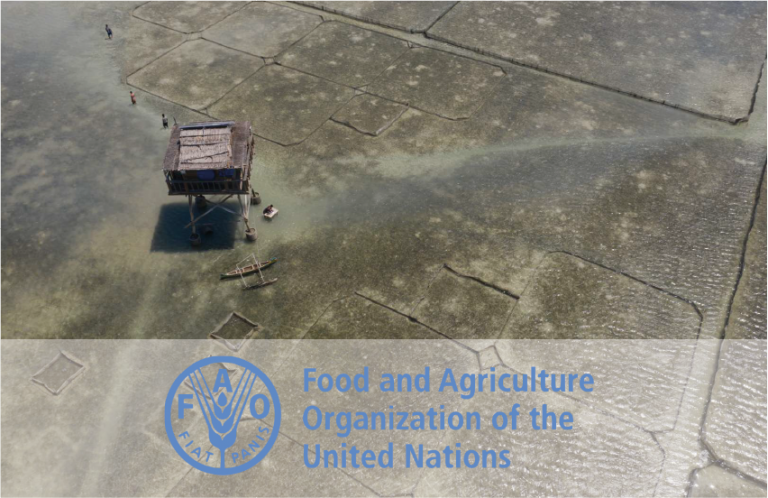Blue Ventures has been working in collaboration with the Food and Agriculture Organisation of the United Nations (FAO) with coastal communities in Zanzibar to diversify their fishing and farming activities by providing training and technical support in sea cucumber aquaculture.
A new article published by the FAO describes the impact of the sharing learning exchange that took place last year, where seaweed farmers on the Zanzibari islands of Unguja and Pemba off Tanzania’s east coast were able to learn more about a lucrative coastal resource: sandfish (a type of what are more commonly known as sea cucumbers).
The sandfish (Holothuria scabra) is a tropical species of sea cucumber that is found along coastlines stretching from East Africa to the far shores of Fiji. It was once an incredibly abundant species, found in densities of tonnes per hectare and formed the basis of many coastal fishers’ livelihoods. This species is also one of the most highly valued tropical sea cucumbers in the world. Driven by insatiable demand – particularly in East Asia, where they are considered a delicacy and have been found to have medicinal value as a bioactive immune booster – sandfish have been overfished across most of its global range.
As wild populations have plummeted, their high value has become potentially lucrative for coastal communities who can, with the right support, farm sandfish with relatively inexpensive maintenance costs. By developing existing farming techniques, and learning from our experience in Madagascar, there is the potential for coastal communities to expand their livelihood opportunities and generate a sustainable income from this highly valuable species.
However, the benefits of sea cucumbers extend beyond their market value. Recent scientific understanding of the role that sea cucumbers play within coastal ecosystems is highlighting the danger of losing this species to extinction. They are critical ecosystem engineers that are vital to the continued health of seagrass meadows and coral reefs – areas of critical biodiversity and ecotourism importance.
With a community of approximately 25,000 seaweed farmers, 80% of whom are female, already working in Zanzibar, the training course provided by the FAO and Blue Ventures offered an opportunity to expand their existing aquaculture-based livelihoods, potentially providing a new sustainable income for coastal communities.
Seaweed farmers often make the best sea cucumber farmers – they already spend their time in the ocean, know the tides and the currents, are used to working with commercial partners and are already aware of the value of these animals. In Zanzibar, the farmers were already collecting the occasional sea cucumber during their seaweed farming activities.
The learning exchange answered many questions that coastal fishers had about sea cucumbers – their biology and habitat preferences, why they are so highly in demand, and how to process and sell them for the greatest profit. The workshop also included practical elements: handling and acclimatisation guidelines, how to create protected grow-out areas, and stock monitoring.
The new aquaculture opportunities, cultivated with seaweed farming groups in Unguja and Pemba, will allow these communities to grow out small, juvenile sea cucumbers in a secure enclosure until they reach the market size where they are most valuable. In turn, this boosts the local bioeconomy and enables the farmers to maintain a more stable income for their families.
Blue Ventures has been developing aquaculture with the help of our partners Indian Ocean Trepang and Ocean-Farmers as an alternative livelihood for coastal fishing communities in Madagascar for over a decade, and we will continue to share the lessons we have learned with other coastal communities across the West Indian Ocean and beyond.
Meet some of Madagascar’s sea cucumber and seaweed farmers in our aquaculture profiles or read some of our blogs on aquaculture.
Thanks to our funders Norges Vel – The Royal Norwegian Society for Development – for their support over the last ten years with our aquaculture programme.

Blue Ventures also benefited from the support of the Prince Albert II of Monaco Foundation www.fpa2.org, in collaboration with the University of Edinburgh.























